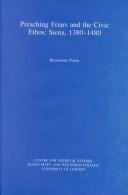| Listing 1 - 3 of 3 |
Sort by
|

ISBN: 1870059069 Year: 1992 Volume: Volume 7 Publisher: London Centre for Medieval Studies, Queen Mary and Westfield College, University of London
Abstract | Keywords | Export | Availability | Bookmark
 Loading...
Loading...Choose an application
- Reference Manager
- EndNote
- RefWorks (Direct export to RefWorks)
Friars --- -Preaching --- -#GOSA:XX.I.A.8b --- #GOSA:XX.III.D.Gero.M --- #GOSA:XX.III.Fil-A.M --- Christian preaching --- Homiletics --- Speaking --- Pastoral theology --- Public speaking --- Mendicant orders --- Christians --- Monasticism and religious orders --- History --- -Religious aspects --- Siena (Italy) --- -Church history --- -Friars --- Preaching --- Sermons, Medieval --- History. --- History and criticism. --- -Siena (Italy) --- History and criticism --- #GOSA:XX.I.A.8b --- Religious aspects --- Sienne (Italy) --- Sienna (Italy) --- Siyenah (Italy) --- Comune di Siena (Italy) --- Siena (Tuscany) --- Church history
Book
Abstract | Keywords | Export | Availability | Bookmark
 Loading...
Loading...Choose an application
- Reference Manager
- EndNote
- RefWorks (Direct export to RefWorks)
Building on important issues highlighted by the late Philip Jones, this volume explores key aspects of the city state in late-medieval and Renaissance Italy, particularly the nature and quality of different types of government. It focuses on the apparently antithetical but often similar governmental forms represented by the republics and despotisms of the period. Beginning with a reprint of Jones's original 1965 article, the volume then provides twenty new essays that re-examine the issues he raised in light of modern scholarship. Taking a broad chronological and geographic approach, the collection offers a timely re-evaluation of a question of perennial interest to urban and political historians, as well as those with an interest in medieval and Renaissance Italy. Introduction Part I Communes and Despots: Communes and despots: the city state in late-medieval Italy, P.J. Jones. Part II Power and Restraint: The use of sortition in appointments in the Italian communes, Daniel Waley; Magnate violence revisited, Carol Lansing. Part III Political Thought: Theory and Practice: Communes and despots: some Italian and Transalpine political thinkers, Robert Black; The myth of the Renaissance despot, Benjamin G. Kohl; Conflicting attitudes towards Machiavelli's works in 16th-century Spain, Rome and Florence, Humfrey C. Butters. Part IV Communes and Despots: Some Case Studies: From commune to regional state: political experiments in 14th-century Cremona, Marco Gentile; The Gonzaga Signoria, communal institutions, and the 'honour of the city': mixed ideas in quattrocento Mantua, David S. Chambers; Giangaleazzo Visconti and the ducal title, Jane Black; Whatever's best administered is best: Paolo Guinigi signore of Lucca, 140030, Christine Meek; The mouse and the elephant: relations between the kings of Naples and the lordship of Piombino in the 15th century, David Abulafia; Communes and despots: the nature of 'diarchy', John E. Law; Concepts of Libertà in Renaissance Genoa, Christine Shaw. Part V The Case of the Medici: Prato and Lorenzo de' Medici, F.W. Kent; The early years of Piero di Lorenzo, 1472-92: between Florentine citizen and Medici prince, Alison Brown; Muddying the waters: Alfonsina Orsini de' Medici and the lake of Fucecchio, Catherine Kovesi; The Medici dukes, Comandati and Pratolino: forced labour in Renaissance Florence, Suzanne B. Butters. Part VI Culture, Art and Patronage: Giovanni Bellini and the background to Venetian painting, George Holmes; Communes, despots and universities: structures and trends in Italian Studi to 1500, Peter Denley; Aedeficia iam in regales surgunt altitudines: the mendicant Great Church in the trecento, Julian Gardner. Epilogue: 'Communes and despots': the opening paragraph, Trevor Dean
Politics --- politieke geschiedenis --- Gonzaga [Family] --- Medici, de [Family] --- anno 500-1499 --- anno 1400-1499 --- Italy
Book
ISBN: 9780754665083 9781315259871 9781351950343 Year: 2010
Abstract | Keywords | Export | Availability | Bookmark
 Loading...
Loading...Choose an application
- Reference Manager
- EndNote
- RefWorks (Direct export to RefWorks)
City-states --- Despotism --- History --- Italy --- Politics and government --- Absolutism --- Autocracy --- Tyranny --- Authoritarianism --- Dictatorship --- Totalitarianism --- Cities and towns --- Federal government --- Municipal government --- Political science --- State, The --- Cités-États --- Despotisme --- Rois et souverains --- Italie --- Jusqu'à 1500 --- Politique et gouvernement
| Listing 1 - 3 of 3 |
Sort by
|

 Search
Search Feedback
Feedback About UniCat
About UniCat  Help
Help News
News